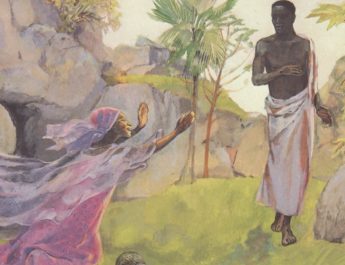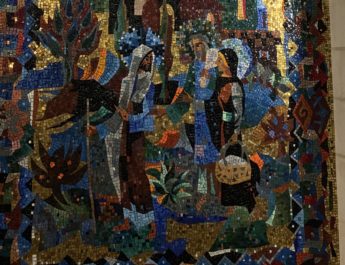Leviticus 19:1-2, 15-18
Ordinary A48
1 The LordA spokeB to Moses,C saying:
A “Lord” = YHVH. From havah (to be, become) or hayah (to come to pass, become, be). This is the name of the God of Israel, the self-existent and eternal one, the tetragrammaton. This pronunciation has been lost to time so “Lord” is generally used in its place.
B “spoke” = dabar. This is generally to speak, answer, declare, or command. It might mean to arrange and so to speak in a figurative sense as arranging words.
C “Moses” = mosheh. From mashah (to pull out in a literal or figurative sense, to draw out) OR from Egyptian mes or mesu (child, son i.e. child of…). This is Moses – the one drawn out from the water, which is to say, rescued. If derived from the Egyptian, his name would share a root with Rameses and Thutmose.
2 Speak to all the congregationD of the peopleE of IsraelF and say to them: You shall be holy,G for I the Lord your GodH am holy.
D “congregation” = edah. From yaad (to appoint, assemble or gather selves, agree) OR from ed (witness, testimony, recorder); from ud (to admonish, repeat, duplicate, testify, restore, record, relieve). This is a congregation, assembly, or company. It could be a family, crowd, or fixture.
E “people” = ben. This is son, age, child. It is son in a literal or figurative sense.
F “Israel” = yisrael. From sarah (to persist, exert oneself, contend, persevere, wrestle, prevail) + el (God or god). This is God strives or one who strives with God; new name for Jacob and for his offspring. This refers to the people and to the land.
G “holy” = qadosh. From qodesh (set apart and so sacred; God is different from us and so God is holy/set apart; things we dedicate to God’s service are set apart for God and so they, too, are holy); related to qadash (set apart, consecrated, hallowed, sanctified; something or someone set apart for a holy purpose or use – ceremonially or morally clean). This is sacred or holy in a ritual or moral sense. As a noun, it refers to a holy one (like a saint or angel), a holy place (the sanctuary), or God (the Holy One).
H “God” = Elohim.
15 You shall not render an unjustI judgment;J you shall not be partial toK, L the poorM
I “unjust” = evel. Perhaps from aval (to deal unjustly, act in a wrongful way, a wrongdoer). This is injustice, wrong, moral evil, acts of violence, or unrighteousness.
J “judgment” = mishpat. From shaphat (to judge, defend, pronounce judgment, condemn, govern). This is a verdict or formal sentence whether from humans or from God. It includes the act of judging as well as the place that judging takes place, the suit itself, and the penalty. Abstractly, this is justice, which includes the rights of the participants.
K “be partial to” = nasa. This to lift in a broad sense, literally and figuratively. So it could be to carry, take, or arise. It could also be bring forth, advance, accept.
L {untranslated} = paneh. From panah (to turn, face, appear). This is face in a literal or figurative sense. It could be face, presence, anger, respect. It can also be used of God to indicate divine favor or presence.
M “poor” = dal. From dalal (to be low, hang, fade, be emptied, become poor, be oppressed). This is lean, weak, needy, poor. Properly, it is one who is dangling.
or deferN toO the great:P with justiceQ you shall judgeR your neighbor.S
N “defer” = hadar. 7x in OT. This may mean to swell in a literal or figurative sense. So, it could be honor, pride, respected, to adorn, claim honor. It could also refer to crooked or rough terrain. Additionally, it can refer to showing partiality or deference.
O {untranslated} = paneh. Same as v15. See note L above.
P “great” = gadol. From gadal (to grow up, become great, become wealthy – to advance. The root meaning may be to twist in the sense of the process of growing). This is great, high, bigger, noble, old, marvelous. It can also refer to someone who is powerful or distinguished.
Q “justice” = tsedeq. This is rightness, righteousness, vindication. It is everything that is just or ethical. That which is right in a natural, moral, or legal sense. It also includes just weights (i.e. true weights). Figuratively, this is justice, righteousness, equity – even prosperity.
R “judge” = shaphat. Related to “judgment” in v15. See note J above.
S “neighbor” = amith. 12x in OT – 11x in Leviticus & 1x in Zechariah. Root may mean to associate. This is a companion, associate, relation, or neighbor.
16 You shall not go aroundT as a slandererU among your people,V and you shall not profitW by the bloodX of your neighbor:Y I am the Lord.
T “go around” = halak. This is go, come, walk. It is walk literally and figuratively and includes people and animals. It can be used figuratively for one’s moral life – how we walk according to God’s way or against it. It can also refer to the walk of life as in the course one’s life takes, the choices we make, etc.
U “slanderer” = rakil. 6x in OT. From rakal (to travel around, especially to trade; so, a merchant or trader; also trade itself). This is slander or one who slanders – a gossip or scandal-monger who goes from place to place.
V “people” = am. From amam (to darken, hide, associate; creating shadows by huddling together). This is people or nation. It can be used specifically for a tribe, collectively of troops or armies, or figuratively to refer to a flock of animals.
W “profit” = amad. This is to stand up in a literal or figurative sense. So it can be establish, continue, endure, take a stand, act, be a servant, stand still, remain, stand against an enemy.
X “blood” = dam. Perhaps from damam (to cease, be or become mute, silent, still, cut off, hold peace, be astonished, die). This is blood, bloodshed, bloodguilt, lifeblood, and death. It is used for people and animals. More often blood from a wound or the blood of the innocent. Used figuratively for violence or for wine. Closely tied to life and death.
Y “neighbor” = rea. From raah (to associate with). This is friend, companion, fellow, neighbor. It is someone with whom you associate, whether more or less close.
17 You shall not hateZ in your heartAA anyone of your kin;BB you shall reproveCC your neighbor,DD or you will incurEE guiltFF yourself.
Z “hate” = sane. This is an enemy or foe. It is one that is hated with a personal hatred.
AA “heart” = lebab. May be related to labab (to encourage; properly, to be encased as with fat; used in a good sense, this means to transport someone with love; used in a bad sense, it can mean to dull one’s senses). This is the heart, courage, one’s inner self, the mind, or the will. Heart is only used in a figurative sense in the Old and New Testaments.
BB “kin” = ach. This is brother, kindred, another, other, like. It is literally brother, but it can also be someone who is similar, resembling, or related to.
CC “reprove” = yakach + yakach. This is to decide, be right, argue, or convince. It can also be to decide, convict, reason together, or reprove. The word is repeated twice – the first time as an Infinitive Absolute. The Infinitive Absolute serves to emphasize the sentiment of the word. It is rather like Foghorn Leghorn’s speech pattern, “I said, I said.”
DD “neighbor” = amith. Same as “neighbor” in v15. See note S above.
EE “incur” = nasa. Same as “be partial to” in v15. See note K above.
FF “guilt” = chet. From chata (to miss, sin, bear blame, to forfeit, lack). This is sin, fault, or punishment of sin.
18 You shall not take vengeanceGG or bear a grudgeHH against any of your people,II but you shall love your neighborJJ as yourself: I am the Lord.
GG “take vengeance” = naqam. This is to avenge, punish, have a grudge, execute.
HH “bear a grudge” = natar. 9x in OT. This is to guard, keep, reserve, take care of. Figuratively, it could be to keep a grudge or hold on to anger.
II “people” = ben + am. Literally “the children of your people.” Ben is same as “people” in v2. See note E above. Am is same as “people” in v16. See note V above.
JJ “neighbor” = rea. Same as “neighbor” in v16. See note Y above.
Image credit: “Unfailing Love” by Sharon Tate Soberon, 2015.




